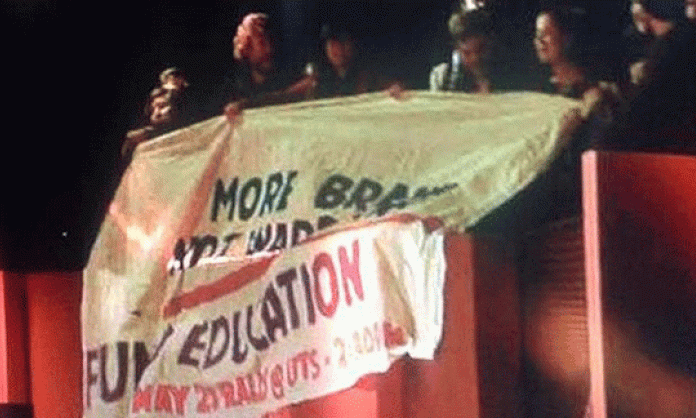In the last couple of days, there’s been a flood of discussion about the protest that myself and other education activists staged on QandA.
For the most part, we’ve had an extremely positive response – from articles and online comments to individual messages of support and encouragement we have received from people we know, and from people we’ve never met who were inspired by what we did.
On the other hand there’s also been a chorus of people tut-tutting our action, claiming that we hijacked a democratic forum and did more harm than good to our cause.
These claims can be challenged just by considering the attention that the issue of higher education cuts has since received, but there’s more to it than that.
Contrary to what Tony Jones thinks, there’s nothing democratic about the mind-numbing conservative consensus that marks QandA. Week after week, the ABC carts out the most right wing panellists it can find, allows a few people to ask pre-approved questions, lets the panellists retort their pre-written answers and passes it off as, in the words of Executive Producer Peter McEvoy, a “free exchange of ideas”. Doublespeak is alive and well.
Our disruption of a tightly controlled TV show was not undemocratic, quite the opposite. Democracy should mean that in a debate about higher education, students and staff who are directly affected and with the most to lose actually have their opinions conveyed.
QandA is a sham democracy. We had 30 seconds each to ask a question, before being silenced by Tony Jones, self-appointed judge of all that is right and fair.
There are people who have asked why we didn’t we stop there. Why didn’t we debate Pyne? If the permanent smirk on his hideous face didn’t give it away, his responses to us did. Christopher Pyne blatantly lied to us, and then proceeded to use his platform to propagandise and justify the imminent cuts.
The entire set up of the show purports to offer reasoned and rational discussion, but you can’t reason with people like Christopher Pyne. He is a born-to-rule Tory and has no interest in the opinions and struggles of students, workers, the poor, or anyone that’s not a rich bastard just like him. He rules for the 1 percent, and no argument, however articulate or measured, will change that.
The other problem is how narrow the framework of debate actually is. After being escorted outside by security, we were discussing the action with ABC staff. One attempted to refute our claim that we had no voice on the panel by the fact that we “had Anna Burke”. That Anna Burke, a member of the party that introduced $2.3 billion in higher education cuts, can be considered an “opposition” to Pyne and the IPA reflects the sad state of politics in this country, and how little debate there actually is in mainstream discourse.
The fact is that none of the political parties represent the voice of students. In any case, we want to speak for ourselves. We want to take on politicians directly and on our own terms. That means putting forward arguments, raising our voices, speaking out of turn, calling out politicians on their lies, and yes, even chanting and using banners.
The political establishment and its official channels and processes aren’t there for us to use, but for people like Christopher Pyne. Students don’t get their speeches broadcast on TV or on the radio, we don’t have mates who run the newspapers. The response we’ve received to our protest doesn’t undermine, but confirms our view that sometimes the only way to be heard is to disrupt business as usual and refuse to be silent in the face of stifling conservatism.
We have reached a critical moment. Higher education is facing the biggest attacks in decades. The Commission of Audit, the Kemp-Norton review into higher education and comments from Pyne himself have indicated that in the upcoming budget, students can expect to see fee increases, the undermining of student welfare and the full or partial deregulation of the higher education system.
There is every reason for students to be pissed off. We don’t want to be polite, we don’t want to be respectful, or courteous, or measured. We are angry about the government destroying our education system and our lives, and we are going to say so.








